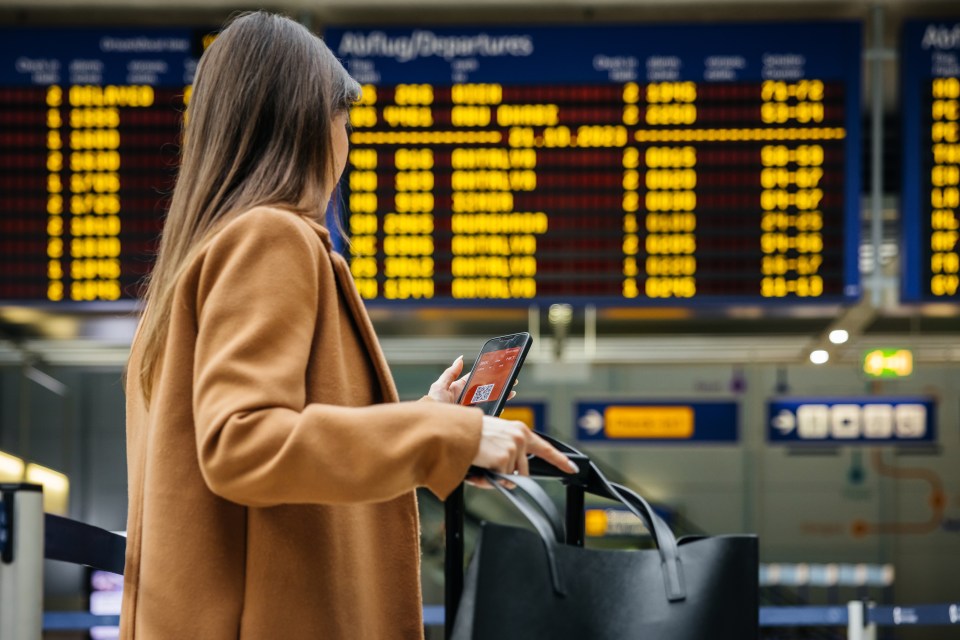TRAVELLERS have been warned of a MAJOR change as boarding passes and check-ins are to be axed.
New airport rules could see passengers able to access their passports through their phones and flow through terminals freely through face recognition.
It’s thought the tech could be operational within the next couple of years, as reported by The Times.
It comes as the International Civil Aviation Organisation (ICAO) is working towards a “digital travel credential”.
This would see check ins scrapped and flyers relying on a “journey pass” on their mobile device.
Bag drops will notify airlines when a passenger arrives, while those carrying hand luggage would be registered at security.
At present, ticket holders check in when the arrive at the airport, with their boarding pass.
Then they navigate security before waiting for their gate number.
But with new systems in the works from Amadeus – the world’s largest travel tech company – everything could change.
Valérie Viale, director of product management told The Times: “These changes are the biggest in 50 years.
“Many airline systems haven’t changed for more than 50 years because everything has to be consistent across the industry and interoperable.
“The last upgrade of great scale was the adoption of e-ticketing in the early 2000s. The industry has now decided it’s time to upgrade to modern systems that are more like what Amazon would use.”
To see the new tech function, airports will need to install face recognition equipment, and scanners that can detect passports from a phone.
These gadgets will also need to be monitored so that data is not stored.
But Amadeus says travellers’ information would be wiped within 15 seconds.
According to Viale, the systems used by Amazon that allow shoppers to track their parcel and open lockers via Bluetooth, is similar to what the aviation industry want to achieve.
There are also plans to see flyers share their location with an airline to receive directions to their departure gate.
British Airways, Air France-KLM, Finnair and Saudia Airlines are understood to be interested in the technology.
It comes as Airports across the UK installed next-generation CT scanners last year.
New passport changes being rolled out tomorrow and it’s bad news if you need a new one

BRITISH passports are about to get more expensive, so it is bad news if you need a new one.
From tomorrow, British passport prices will rise by seven per cent, with an online application jumping up by £6 to £94.50.
Children’s passports will be rising too, with the standard application fee from within the UK rising from £57.50 to £61.50.
Frequent traveller passports with 54-pages will also increase in price.
Whilst not confirmed, the current price for one of these passports is £100.50 and could rise to a similar price as the postal application at £107.
For the meantime, individuals who travel a lot may still want to consider getting a larger passport as EU countries will still “wet stamp” a passport.
Whilst the EU’s new Entry/Exit System eventually involves the phasing out of ‘wet stamping’ and moving to digital recording processes, the EU recently announced the roll-out of the system will be staggered, from October 2025.
This means until October, Brits travelling to Europe will still receive physical stamps in their passports and past October, the staggered roll-out means that it will be a while before this process is completely stopped.
Postal passport applications also come with many cons and are one of the more expensive options, especially with the price rise.
A postal application is more expensive than applying online, and the whole process could face delays and extra fees, as paper applications take longer to process.
For example, applying through the Post Office ‘Check and Send’ service incurs an extra fee, and you will also need to pay for your own photos.
Paper applications are also more likely to experience errors, which can lead to further delays or even rejections.
For those needing a passport, if you put your application in to renew it by the end of today, you could save yourself the price rise.
However, for those needing to renew their passport after April 10, the fee increases will apply with all application types rising in cost.
Holidaymakers travelling through the selected airports were glad to wave goodbye to the 100ml liquids rule.
New CT scanners were set to allow people to travel with 2litres of liquids because the high-tech machines create a 3D image of what is inside passengers’ bags.
The advanced technology was welcomed by weary travellers tired of squeezing every essential into tiny bottles.
But, those making their way through security at Leeds Bradford, London City, Aberdeen, Southend, and Teesside airports have been urged to pack light once again.
And, London Gatwick, London Stansted, East Midlands and Manchester Airport have now confirmed scanners will not be functional until later this year.
The scanners were also aimed to reduce queues by allowing passengers to keep their laptops and liquids loose in their hand luggage while going through security.
Meanwhile, last year the Home Office announced plans to upgrade e-gates at the UK border for arriving passengers.
The new e-gates would get rid of the need for passengers to show their passport.
The new airport scanners explained

The Sun’s Head of Travel Lisa Minot has explained how the new scanners will change the way Brits travel through UK airports.
She said: “The new generation of CT scanners will be a huge boost to passengers flying out of UK airports.
“Laptops and other electronic devices can stay in your luggage and there’s no need to stick to the current 100ml liquid restriction that has been in place for the last 18 years.
“Eventually, you’ll be able to take up to two litres of liquids without having to remove them from your hand luggage.
“But the scanners are a huge logistical nightmare for airports who have to install the new machines while still processing large numbers of passengers via the old ones.
“Birmingham will be the first major UK airport to switch to the new scanners on June 1 – giving travellers a quicker, less complicated security experience. Teesside and London City airports are already using the new system.
“But it’s worth bearing in mind that not all airports across the globe have the equipment.
“You may well be able to fly out with liquids over 100ml – but if the airport you fly home from doesn’t have them yet you could find yourself coming a cropper.
“While we transition over the next couple of years you’ll need to make sure you’re aware of the arrangements in any airport you fly through.”








